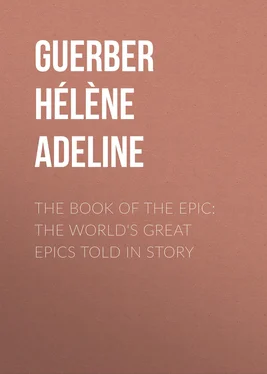Hélène Guerber - The Book of the Epic - The World's Great Epics Told in Story
Здесь есть возможность читать онлайн «Hélène Guerber - The Book of the Epic - The World's Great Epics Told in Story» — ознакомительный отрывок электронной книги совершенно бесплатно, а после прочтения отрывка купить полную версию. В некоторых случаях можно слушать аудио, скачать через торрент в формате fb2 и присутствует краткое содержание. Издательство: Иностранный паблик, Жанр: foreign_poetry, Поэзия, foreign_antique, foreign_prose, на английском языке. Описание произведения, (предисловие) а так же отзывы посетителей доступны на портале библиотеки ЛибКат.
- Название:The Book of the Epic: The World's Great Epics Told in Story
- Автор:
- Издательство:Иностранный паблик
- Жанр:
- Год:неизвестен
- ISBN:нет данных
- Рейтинг книги:4 / 5. Голосов: 1
-
Избранное:Добавить в избранное
- Отзывы:
-
Ваша оценка:
- 80
- 1
- 2
- 3
- 4
- 5
The Book of the Epic: The World's Great Epics Told in Story: краткое содержание, описание и аннотация
Предлагаем к чтению аннотацию, описание, краткое содержание или предисловие (зависит от того, что написал сам автор книги «The Book of the Epic: The World's Great Epics Told in Story»). Если вы не нашли необходимую информацию о книге — напишите в комментариях, мы постараемся отыскать её.
The Book of the Epic: The World's Great Epics Told in Story — читать онлайн ознакомительный отрывок
Ниже представлен текст книги, разбитый по страницам. Система сохранения места последней прочитанной страницы, позволяет с удобством читать онлайн бесплатно книгу «The Book of the Epic: The World's Great Epics Told in Story», без необходимости каждый раз заново искать на чём Вы остановились. Поставьте закладку, и сможете в любой момент перейти на страницу, на которой закончили чтение.
Интервал:
Закладка:
H. A. Guerber
The Book of the Epic: The World's Great Epics Told in Story
INTRODUCTION
Every now and then in our reading we come suddenly face to face with first things,—the very elemental sources beyond which no man may go. There is a distinct satisfaction in dealing with such beginnings, and, when they are those of literature, the sense of freshness is nothing short of inspiring. To share the same lofty outlook, to breathe the same high air with those who first sensed a whole era of creative thoughts, is the next thing to being the gods' chosen medium for those primal expressions.
All this is not to say that the epic is the oldest form of literary expression, but it is the expression of the oldest literary ideas, for, even when the epic is not at all primitive in form, it deals essentially with elemental moods and ideals. Epical poetry is poetic not because it is metrical and conformative to rhythmical standards,—though it usually is both,—but it is poetry because of the high sweep of its emotional outlook, the bigness of its thought, the untamed passion of its language, and the musical flow of its utterance.
Here, then, we have a veritable source book of the oldest ideas of the race; but not only that—we are also led into the penetralia of the earliest thought of many separate nations, for when the epic is national, it is true to the earliest genius of the people whose spirit it depicts.
To be sure, much of literature, and particularly the literature of the epic, is true rather to the tone of a nation than to its literal history—by which I mean that Achilles was more really a Greek hero than any Greek who ever lived, because he was the apotheosis of Greek chivalry, and as such was the expression of the Greeks rather than merely a Greek. The Iliad and the Odyssey are not merely epics of Greece—they are Greek.
This is an age of story-telling. Never before has the world turned so attentively to the shorter forms of fiction. Not only is this true of the printed short-story, of which some thousands, more or less new, are issued every year in English, but oral story-telling is taking its deserved place in the school, the home, and among clubs specially organized for its cultivation. Teachers and parents must therefore be increasingly alert, not only to invent new stories, but—this even chiefly—to familiarize themselves with the oldest stories in the world.
So it is to such sources as these race-narratives that all story-telling must come for recurrent inspirations. The setting of each new story may be tinged with what wild or sophisticated life soever, yet must the narrator find the big, heart-swelling movements and passions and thraldoms and conquests and sufferings and elations of mankind stored in the great epics of the world.
It were a life-labor to become familiar with all of these in their expressive originals; even in translation it would be a titanic task to read each one. Therefore how great is our indebtedness to the ripe scholarship and discreet choice of the author of this "Book of the Epic" for having brought to us not only the arguments but the very spirit and flavor of all this noble array. The task has never before been essayed, and certainly, now that it has been done for the first time, it is good to know that it has been done surpassingly well.
To find the original story-expression of a nation's myths, its legends, and its heroic creations is a high joy—a face-to-face interview with any great first-thing is a big experience; but to come upon whole scores of undefiled fountains is like multiplying the Pierian waters.
Even as all the epics herein collected in scenario were epoch-making, so will the gathering of these side by side prove to be. Literary judgments must be comparative, and now we may place each epic in direct comparison with any other, with a resultant light, both diffused and concentrated, for the benefit of both critics and the general reader.
The delights of conversation—so nearly, alas, a lost art!—consist chiefly in the exchange of varied views on single topics. So, when we note how the few primal story-themes and plot developments of all time were handled by those who first told the tales in literate form, the satisfaction is proportionate.
One final word must be said regarding the interest of epical material. Heretofore a knowledge of the epics—save only a few of the better known—has been confined to scholars, or, at most, students; but it may well be hoped that the wide perusal of this book may serve to show to the general reader how fascinating a store of fiction may be found in epics which have up till now been known to him only by name.
J. Berg Esenwein"It is in this vast, dim region of myth and legend the sources of the literature of modern times are hidden; and it is only by returning to them, by constant remembrance that they drain a vast region of vital human experience, that the origin and early direction of that literature can be recalled."—Hamilton Wright Mabie.
FOREWORD
Derived from the Greek epos , a saying or oracle, the term "epic" is generally given to some form of heroic narrative wherein tragedy, comedy, lyric, dirge, and idyl are skilfully blended to form an immortal work.
"Mythology, which was the interpretation of nature, and legend, which is the idealization of history," are the main elements of the epic. Being the "living history of the people," an epic should have "the breadth and volume of a river." All epics have therefore generally been "the first-fruits of the earliest experience of nature and life on the part of imaginative races"; and the real poet has been, as a rule, the race itself.
There are almost as many definitions of an epic and rules for its composition as there are nations and poets. For that reason, instead of selecting only such works as in the writer's opinion can justly claim the title of epic, each nation's verdict has been accepted, without question, in regard to its national work of this class, be it in verse or prose.
The following pages therefore contain almost every variety of epic, from that which treats of the deity in dignified hexameters, strictly conforms to the rule "one hero, one time, and one action of many parts," and has "the massiveness and dignity of sculpture," to the simplest idylls, such as the Japanese "White Aster," or that exquisite French mediaeval compound of poetry and prose, "Aucassin et Nicolette." Not only are both Christian and pagan epics impartially admitted in this volume, but the representative works of each nation in the epic field are grouped, according to the languages in which they were composed.
Many of the ancient epics are so voluminous that even one of them printed in full would fill twenty-four volumes as large as this. To give even the barest outline of one or two poems in each language has therefore required the utmost condensation. So, only the barest outline figures in these pages, and, although the temptation to quote many choice passages has been well-nigh irresistible, space has precluded all save the scantiest quotations.
The main object of this volume consists in outlining clearly and briefly, for the use of young students or of the busy general reader, the principal examples of the time-honored stories which have inspired our greatest poets and supplied endless material to painters, sculptors, and musicians ever since art began.
THE BOOK OF THE EPIC
GREEK EPICS
The greatest of all the world's epics, the Iliad and the Odyssey, are attributed to Homer, or Melesigenes, who is said to have lived some time between 1050 and 850 B.C. Ever since the second century before Christ, however, the question whether Homer is the originator of the poems, or whether, like the Rhapsodists, he merely recited extant verses, has been hotly disputed.
Читать дальшеИнтервал:
Закладка:
Похожие книги на «The Book of the Epic: The World's Great Epics Told in Story»
Представляем Вашему вниманию похожие книги на «The Book of the Epic: The World's Great Epics Told in Story» списком для выбора. Мы отобрали схожую по названию и смыслу литературу в надежде предоставить читателям больше вариантов отыскать новые, интересные, ещё непрочитанные произведения.
Обсуждение, отзывы о книге «The Book of the Epic: The World's Great Epics Told in Story» и просто собственные мнения читателей. Оставьте ваши комментарии, напишите, что Вы думаете о произведении, его смысле или главных героях. Укажите что конкретно понравилось, а что нет, и почему Вы так считаете.











